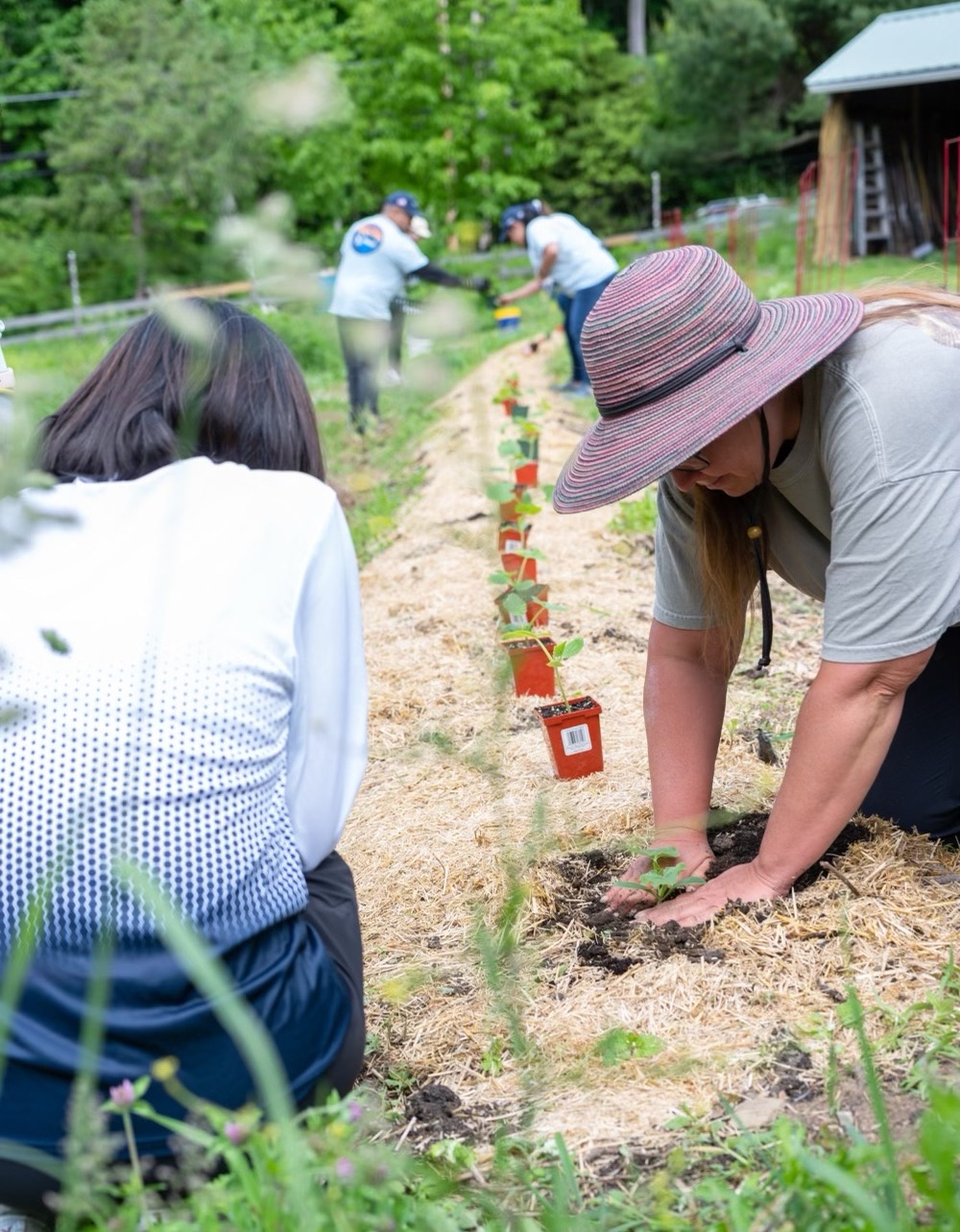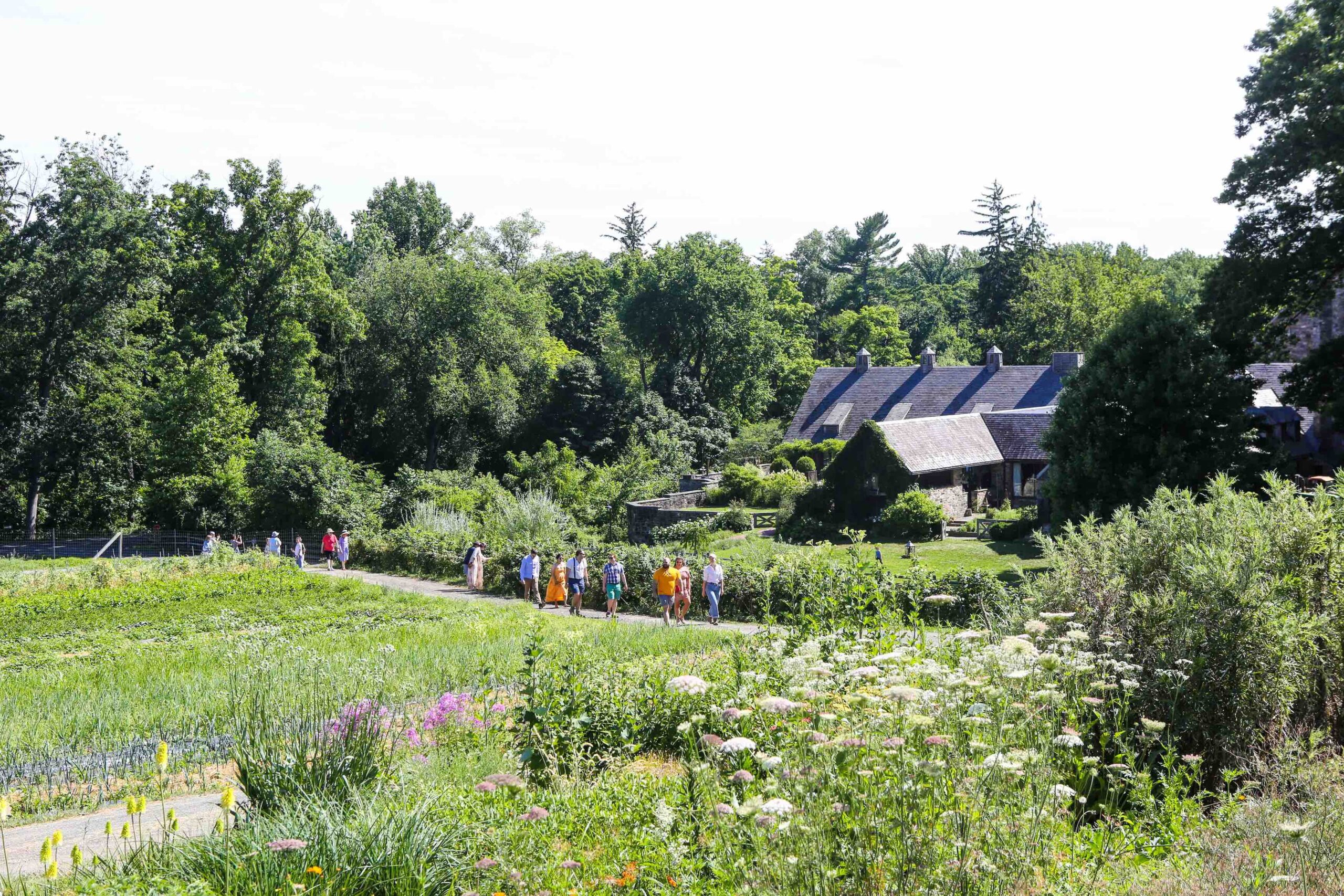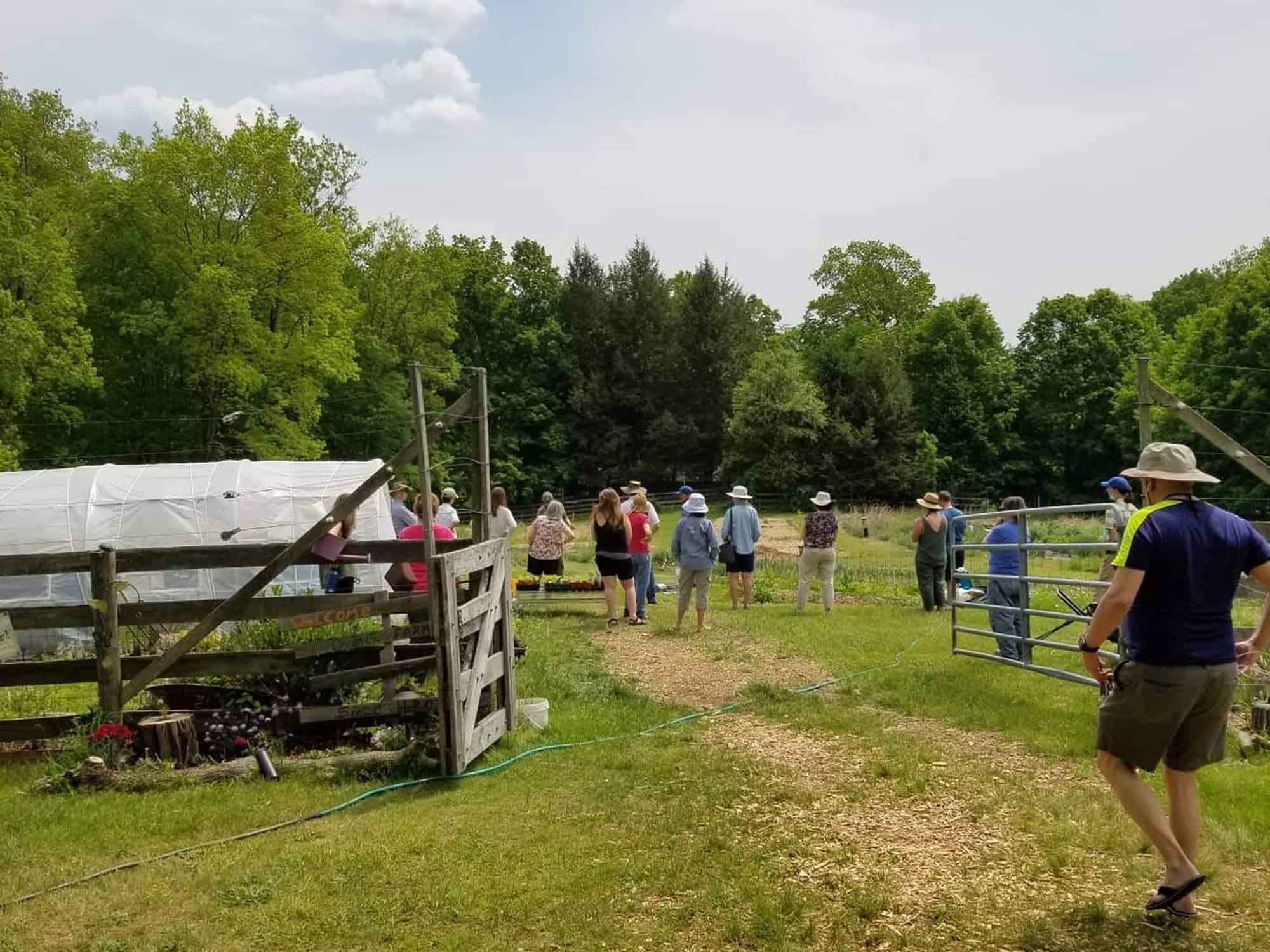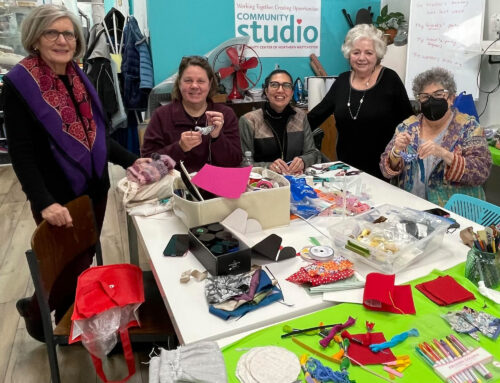Local farms are integral to our community: they grow food we eat, educate people of all ages and support vulnerable people.
In Westchester, a handful of non-commercial farms prioritize people over profits. They grow food that’s healthy for our bodies and the planet. They empower students, volunteers and curious people of all ages in classes, workshops and activities, and they train future farmers. Some of these farms offer therapeutic support to formerly incarcerated people and those with disabilities. Plus, they donate a portion of their harvest to food pantries and/or directly to families in need.
Ultimately, these farms help us commune with the land — and with each other.
Community education
Local farms are lively places to learn.
At Hilltop Hanover Farm in Yorktown Heights, education spans generations and cultures. You’ll find a five-year old girl planting basil seeds and frolicking with goats, a teenager harvesting peppers, carrots, and lettuce and stocking the farm stand, students from an English Language Learner (ELL) class gardening and sharing memories of family farms in Ecuador and Guatemala, and adults learning valuable skills like how to cultivate tomatoes, sharpen gardening tools and fix tractors.
In 2022, Hilltop Hanover educated 3,500 local students, from preschoolers to an AP environmental science class. The farm also hosts camps during school vacations in February, April and August.
“We want as many young people to be as excited about farming as possible,” says Jo Moore, the education programs manager. “Basically, I’m trying to make environmentalists out of them by showing them how you can take care of your environment with the thing that we all need to do, which is eat.”
Beyond class trips, Hilltop Hanover also runs internships for high school students like Jessy Kennedy who interned during the spring of her senior year at John Jay High School. Her responsibilities included digging, planting, irrigating, mosquito netting and harvesting.
“Before, I didn’t have extensive gardening experience,” says Kennedy, now an environmental studies major at the University of Vermont. “The internship definitely improved my knowledge of what plants need.”
Teleah Rampersad also interned at the farm during high school, exploring farming as a potential career.
“Literally, I learned something every day,” says Rampersad, who grew tomatoes, tended to goats and cows, and led school tours. “Big shout out to the team. They’re so passionate. They love teaching people.”
In 2022, Rampersad returned to Hilltop Hanover to finish her agricultural business major at SUNY Cobleskill. Now, she’s shopping for land to start her own farm.
In North Salem, D.I.G. Farm welcomes an eclectic mix of people whose learning is mutually beneficial. More than 400 volunteers provide most of the farm’s labor — planting, weeding, mulching and harvesting; in exchange, they receive a share of the vegetables they help grow.
“It’s extremely rewarding to grow your own food,” says Allison Turcan, who founded the nonprofit D.I.G. (the acronym stands for Dealing in Good) after a year of volunteering on organic farms in France. “It’s not that hard; you just have to put in a little bit of effort. And yes, if you do it on a bigger scale, it’s a lot of work. But the rewards of coming out and harvesting your dinner are pretty huge.”
Beyond teaching people how to grow and harvest produce, D.I.G. provides cooking, preserving and foraging classes for adults, school, homeschool field trips and even corporate retreats. Turcan estimates that 200 people attended these educational programs last year.
And, of course, there’s the renowned Stone Barns Center for Food and Agriculture in Pocantico Hills, which many local and regional farmers say spearheaded educational programming on farms.
The 80-acre property, originally owned by the Rockefeller family, was transformed into a nonprofit in 1996 with the goal of reconnecting visitors with their sources of food by being “open to the public as a hub of learning.”
They offer tours and tastings in their greenhouse and growing spaces; cooking, farming, gardening and botanical beverage classes; family field trips; eco hikes; artisan workshops and demonstrations. Last year, approximately 7,000 visitors attended these educational programs.
Like Hilltop and D.I.G., Stone Barns Center educates enthusiastic young people. Haley Kerner apprenticed at the center three years ago. Now, she tends vegetables in the greenhouse, where the crop includes carrots, radicchio, purple tsa tsai, and a towering banana tree. Unofficially, she often fields visitors’ requests for gardening advice.

A volunteer plants seedlings at D.I.G Farm.
Giving back
Local farms also give back to vulnerable members of the community.
Last summer, formerly incarcerated women convened at D.I.G. for an eight-week therapeutic program including farm chores, a healing circle and communal meals. The “Growing Together” program was started by Family Services of Westchester, which contracted D.I.G. to host and help tend the garden at the prison in Valhalla.
At that garden, Turcan bonded with an incarcerated woman who later came to D.I.G. after her release.
“I was so excited when I saw her arrive with the group. She loved the farm, the animals and the meal that we had prepared,” Turcan says. “I believe the ladies benefit from the natural environment and farm to table food. They’re really able to step away from the challenges they face and just relax and breathe for a while.”
Last year, D.I.G. provided weekly lessons to groups from Ability Beyond, a non-profit serving 3,000 adults in New York and Connecticut, with “developmental disabilities, autism spectrum disorder, brain injury, mental illness, and often, accompanying physical challenges.”
The group helped with garden work and also learned how to make pickles and pesto with produce grown on the farm.
Turcan also donates food to the Community Center of Northern Westchester (CCNW) through D.I.G. and Sugar Hill Farm in Bedford Hills – Sugar Hill is a partnership between Westchester Land Trust (WLT), CCNW and Turcan, who co-leads the program. The half-acre garden plot on Harris Road in Bedford grew approximately 1,000 pounds of produce last year, and Turcan says she donated an equal amount from her North Salem farm.
“We’re making a big amount of difference with a small amount of land,” says Kara Whelan, president of WLT.
During the pandemic, Whelan adds, the land trust was “inundated” with calls from food pantries and food justice groups, seeking fresh produce and land for farming.
Hilltop Hanover also feeds families facing food insecurity. Every Monday from July to October, volunteers fan through the fields and glean excess crops, which they distribute to local food pantries.
In 2022, the farm donated nearly 25 percent of its harvest– 8,600 pounds of produce – to food pantries, and they subsidized an additional 94 of their 264 “farm shares” of vegetables.
“The impact of a farm like Hilltop is incredibly vast,” says Martha Elder, executive director of Second Chance Foods, a non-profit group that collects and distributes excess crops from local farms, including Hilltop Hanover.
Similarly, the Stone Barns Center gives back to its neighbors. In 2022, 150 households subscribed to vegetable farm shares; the farm donated 25 of those shares and subsidized others to SNAP recipients. They pair food boxes with information in English and Spanish about the vegetables’ history, their farming experiments and the challenges facing regional farmers.
Stone Barns Center also partners with Sleepy Hollow High School. Last year, they donated seedlings to the school’s garden, which is run by neurodiverse students as part of their curriculum, as well as food boxes and Thanksgiving turkeys to the school’s food pantry.
The program is run by Carolina Saavedra who was recruited in 2018 to help extend their school-based food education curriculum and make it more culturally relevant. The daughter of immigrants from Oaxaca, Mexico, she previously worked as a sous chef in her family’s Bronx restaurant, La Morada, but she shifted her focus after the pandemic shuttered the curriculum initiative.
“I was raised in an activist family in a marginalized community,” Saavedra explains. “I was raised with an income below the poverty line. I know what it is to stand on a food pantry line. So why not help my neighbor now that I’m working at a place like this?”
The center’s support extends to New York City where, last year, they gave vegetable and pollinator garden seed kits to five urban community gardens in the South Bronx and Brownsville, serving 40 households in two of the city’s poorest neighborhoods.
In 2023, they hope to expand the program, via a Jerome L. Greene Foundation grant, and support community efforts to grow vegetables.

A group tour at Stone Barns Center in Pocantico Hills. Photo by Lori Berkowitz for Stone Barns Center for Food & Agriculture.
A symbiotic relationship
Farms help us appreciate what we take for granted: food doesn’t come from grocery stores or boxes delivered to our doorsteps, but from farmers whose knowledge and labor literally keeps us alive.
“We can’t survive without creating food for ourselves,” says Moore, of Hilltop Hanover Farm. “And we can’t ultimately survive as a species without creating food in a way that’s sustainable.”
Local farms also help us appreciate our natural resources – land, water, soil – and pay more attention to the environmental impact of the food we eat. Amid a climate crisis that threatens our existence as a species, local farms offer a model for a sustainable future.
Ultimately, local farms and local communities have a symbiotic relationship. To thrive, farms need people — and people need farms.
This article was published in the March/April 2023 print edition of Katonah Connect.
Keith Meatto
Keith Meatto is a writer whose reporting, essays, reviews and fiction have appeared in The New York Times, The Forward, Guernica and many other newspapers, magazines and journals. He teaches academic writing at NYU and creative writing at the two prisons in Bedford Hills. As an editor, he helps private clients elevate and deepen their storytelling. “All my work is about connecting with people intellectually and emotionally via language and stories,” says Keith, who moved with his family to Katonah from Brooklyn in 2020.










